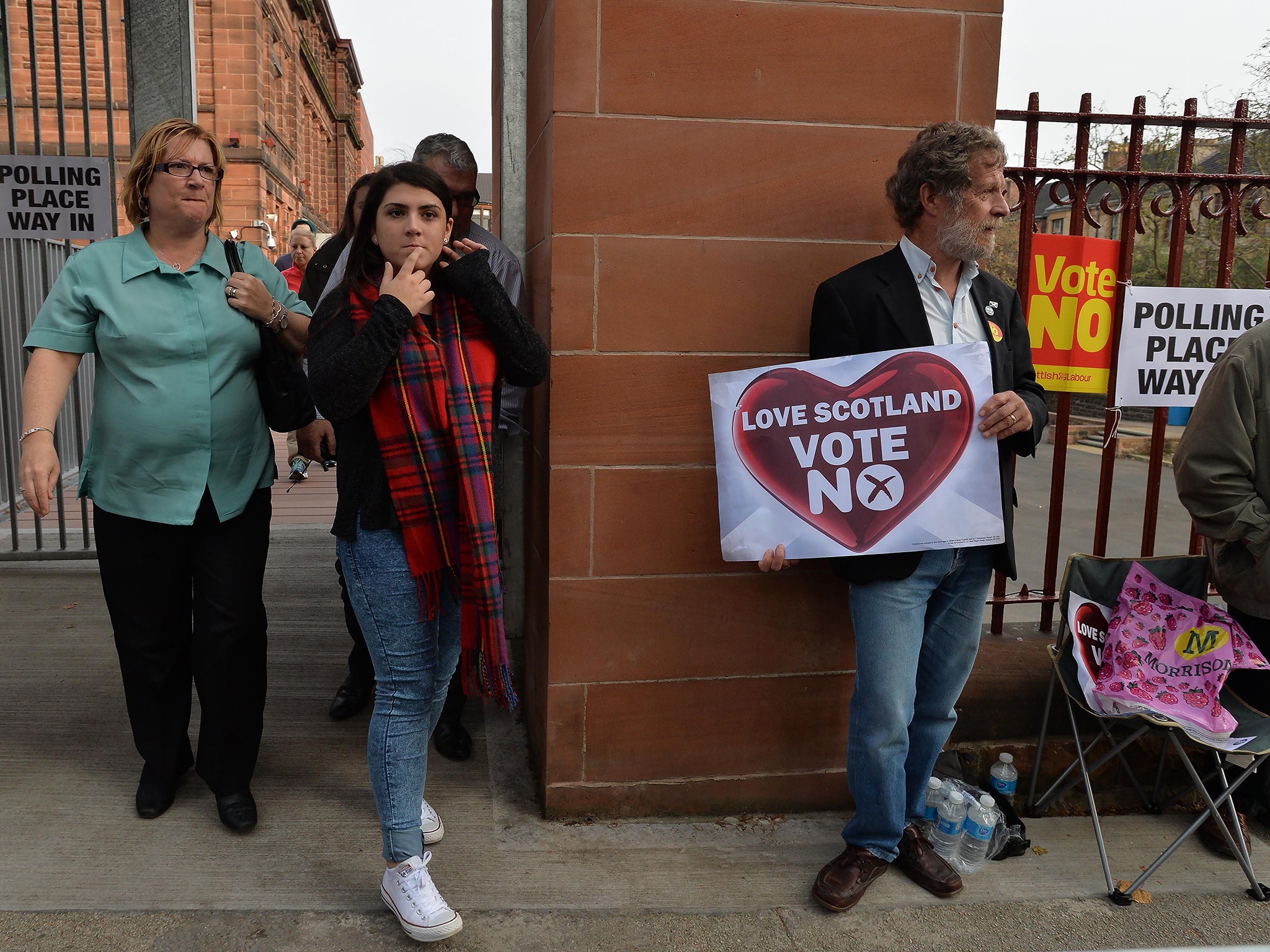Scottish independence: Lacking the theatricality of the Yes camp, the No campaign quietly gets out its vote

If there was a contest for flag-waving and high-profile street campaigning, Alex Salmond’s Yes campaign will have already taken Scotland back from Westminster. But in Glasgow, Aberdeen, in Edinburgh, and elsewhere, the lower-volume and less visibly patriotic campaign to keep Scotland part of the United Kingdom concentrated on only one thing – getting out its vote.
With Alistair Darling, Gordon Brown, and Ed Miliband all keeping relatively quiet, the backroom operation of the No vote, the bands of canvassers and activists who have surveyed Scotland for the past months, were returning to the doors that said they would vote No to separation.
In Glasgow, fleets of mostly Labour volunteers visited some of the highrise blocks in the south and east of the city that house mainly elderly residents. One volunteer in Drumchapel said: "We have a job. We’ve known where help was needed, where an elderly voter who didn’t register a postal vote needs to be taken to a polling station. We’re doing just that.”
Blue-flagged street stalls and gatherings of Yes supporters were still evident on main streets and high streets throughout Scotland. But at polling stations, No officials, offering last-minute leaflets outside schools and community centres, reported a continuing reluctance for their supporters to openly admit their ballot paper would be marked No.
Scotland goes to the polls
Show all 20“We are relying on an almost under-the-counter thumbs up from people as they leave polling stations,” said one official in Glasgow’s West End where almost 40 percent of the constituency’s registered voters had arrived and voted by 2pm.
At the top of the Better Together campaign the entire final-hours operation was to be based on getting out the vote.
One official said: “This is where our confidence comes from, where we deliver, where we consolidate the promises that have been given to us on doorsteps. We knock and we knock again till the polls close. Urgency? Sure – this has become unlike anything we’ve ever seen. No general election, no Holyrood election – nothing is like this.”
In Glasgow’s George Square, where a flashmob of Yes supporters almost took over the civic heart of Scotland’s biggest city on Wednesday night, the Yes side’s sense of control was still there. One kilt-wearing supporter, wrapped in a Saltire, who said “I'll be here all night”.
On another side of the square, inside the café of the Millennium Hotel, a group of No voters admitted their “team” had lacked the passion of their opponents. One said: “Maybe we should be out there now, shouting the same as them. But we haven’t shouted – and I hope to hell shouting doesn’t win this.”
In Shettleston, in the constituency of the Shadow Scottish Secretary Margaret Curran, who had been out campaigning with Labour's Harriet Harman on Wednesday, the street theatre of Scotland’s historic decision seemed to be dominated by the Saltire and swagger of Yes.
But again the No campaigners were choosing a different tactic. Along London Road, near the city’s famous Parkhead football stadium, home to Glasgow Celtic, Labour activists were still returning to homes for last-minute checks.
Suggestions that the turnout will be above 80 percent – and closer to 90 than 80 – were borne by out by early comments from returning officials anxious to say nothing more than it would “a historic high”.
Blair McDougall, the director of the Better Togther campaign, simply said the turnout was “very high”. His campaign’s message, since the return of Gordon Brown as its effective frontline figure, appears to have had some effect among No voters. One of Mr McDougall’s officials said that despite setbacks and criticism, “we will win”.
But there was a caveat: “Scotland has changed and this vote will not unite us. Will there be trouble if we win? I’m afraid the answer to that will be seen on streets on Friday and Saturday night.”
Subscribe to Independent Premium to bookmark this article
Want to bookmark your favourite articles and stories to read or reference later? Start your Independent Premium subscription today.

Join our commenting forum
Join thought-provoking conversations, follow other Independent readers and see their replies